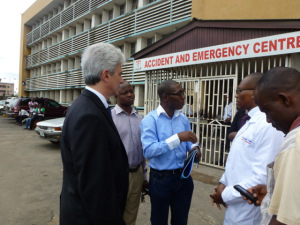by
Loren Bonner, DOTmed News Online Editor | May 15, 2014

David Barash, CMO, GE Foundation
at the the Lagos University Teaching Hospital
in Nigeria
It's common to hear about nurses and doctors visiting poor countries to provide much-needed medical care, but what about the equipment that is so critical in supporting these volunteers and local health care providers?
In recognition of a need to repair and service equipment, the GE Foundation has teamed up with the Developing World Healthcare Technology Laboratory at Duke University and Engineering World to help build a sustainable pipeline of local, qualified medical engineers in Nigeria.
"The shortage of functional medical equipment is a barrier to the efficient delivery of care in Sub-Saharan Africa," said Dr. David M. Barash, executive director and chief medical officer of the GE Foundation.



Ad Statistics
Times Displayed: 64799
Times Visited: 2121 Ampronix, a Top Master Distributor for Sony Medical, provides Sales, Service & Exchanges for Sony Surgical Displays, Printers, & More. Rely on Us for Expert Support Tailored to Your Needs. Email info@ampronix.com or Call 949-273-8000 for Premier Pricing.
The World Health Organization reports that roughly 50-80 percent of medical equipment in low-income countries is unusable, making equipment repair services that much more essential. In addition, surveyed hospitals reported difficulty finding qualified medical technicians to repair and service medical equipment, with hospitals in Africa topping that need at 85 percent. In Nigeria alone, 50 percent of hospital equipment is out of service.
The $1.5 million grant program, to be administered over a three-year period, will train local students at a newly created Federal School of Biomedical Engineering Technology at the Lagos University Teaching Hospital.
GE calls it a scalable program and bases it on other Biomedical Equipment Technician Training (BMET) projects already underway in Rwanda, Ghana, Cambodia and Honduras, all of which GE has also been involved with.
"The training we provide through this program ensures that local institutions and providers own the process of training technicians and, as a result, build their community's confidence in the local health system," said Dr. Robert Malkin of Duke University's Developing World Technology Lab. "In the end, this will help maximize the value of donated equipment in the region and dramatically break down this barrier to the delivery of care."

